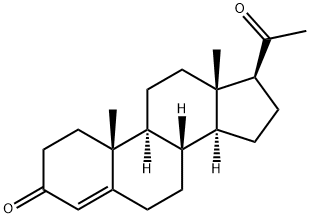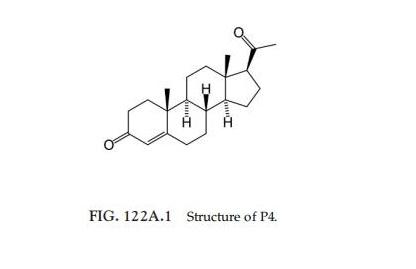Physiological effects of progesterone
Introduction
Progesterone, also known as progesterone hormone and progesterone hormone, is the main biologically active progesterone secreted by the ovary[1]. The molecular formula is C21H30O2. Before ovulation, the amount of progesterone hormone produced per day is 2 to 3 mg, mainly from the ovaries. After ovulation, it rises to 20-30 mg per day, most of which is secreted by the corpus luteum in the ovary. Progesterone can protect the endometrium of women. During pregnancy, progesterone hormones can provide support and protection for the early growth and development of the fetus, and can play a certain role in calming the uterus. In addition, the relationship between progesterone and estrogen is inseparable, both of which are very important female hormones. The role of estrogen is mainly to promote the development and maturity of female secondary sexual characteristics, while progesterone further promotes the development and maturity of secondary sexual characteristics on the basis of the role of estrogen, and there is a synergistic effect between the two.
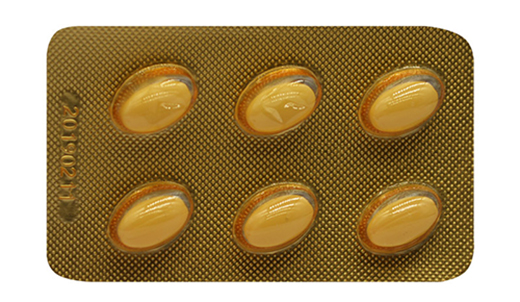
Picture 1 Progesterone tablets
Preparation of progesterone
Obtained from the oxidation of pregnenolone. Add dry toluene into the dry reaction pot, add cyclohexanone and pregnenolone, stir to dissolve, evaporate toluene to dehydrate to the end, quickly add aluminum isopropoxide, oxidize at 115°C for 2h, cool to about 80°C, 5% dilute sulfuric acid was added under stirring, the layers were left to stand, the water layer was separated, the toluene layer was washed with water until neutral, and then steam distilled to remove toluene and cyclohexanone. Cooled, filtered, and the filter residue was stirred into a slurry with petroleum ether, filtered, washed with petroleum ether, and dried to obtain crude progesterone. The crude product was dissolved in ethanol, decolorized with activated carbon, and the finished product was recrystallized with a yield of 80%.
Pharmacological effects of progesterone during menstruation
During the second half of the menstrual cycle, progesterone promotes glandular growth in the endometrium, hyperemia of the uterus, thickening of the endometrium in preparation for implantation of a fertilized egg, and reduces the excitability of the uterus during pregnancy, inhibiting its activity and relaxing smooth muscles , allowing the embryo to grow safely. Under the joint action of estrogen, progesterone promotes the development of breast lobules and glands, so that the breasts can fully develop and prepare for lactation. Progesterone closes the cervix, reduces and thickens the mucus, and makes it difficult for sperm to penetrate; in large doses, it inhibits the secretion of pituitary gonadotropin through a negative feedback effect on the hypothalamus, resulting in the inhibition of ovulation. After ovulation, on the basis of the action of progesterone hormone, the endometrium continues to thicken and hyperemia, the glands proliferate and branch, from the proliferative phase to the secretory phase, which is conducive to the implantation and embryonic development of pregnant eggs. Progesterone inhibits uterine contractions and reduces the sensitivity of the uterus to oxytocin, allowing the fetus to grow safely. Progesterone competes against aldosterone, thereby promoting Na and Cl excretion and diuresis. Progesterone can slightly increase body temperature in normal women, so the basal body temperature in the luteal phase of the menstrual cycle is higher than that in the follicular phase.
The role of progesterone in menopause
The arrival of menopause often means the advent of aging, which is a transitional period in which women's ovarian function gradually declines from a strong state to complete disappearance, including menopause and a period before and after menopause.
Menopause syndrome has become a serious problem affecting women's health. After women enter menopause, it means the beginning of menopause, and many changes will occur in the body at this time. In addition to some external changes such as: menstrual disorders, reproductive organ atrophy, amenorrhea, menopause, the internal changes are mainly changes in material metabolism. The most prominent are fat metabolism disorders and calcium and phosphorus metabolism disorders. The former makes dyslipidemia easy to induce atherosclerosis, coronary heart disease and cerebrovascular disease, etc.; the latter makes bone loss faster and causes osteoporosis and joint pain.
Menopause will cause changes in women's body and spirit, such as: loss of patience, tension, impulsiveness, etc., various adverse symptoms in the body, often leading to hysteria, imbalances in social relations, and deterioration of family relations.
In order to improve the quality of life of menopausal women, progesterone hormone supplementation can most obviously and immediately relieve the related symptoms caused by hormone deficiency, and delay aging. It is better to use it in combination with estrogen. The long-term benefit is to prevent osteoporosis caused by excessive loss of bone minerals, and also to help preserve brain function, at least delaying the onset of naturally occurring Alzheimer's disease.
The role of progesterone in pregnancy
Progesterone can suppress uterine contractions. Some people think that progesterone can change the permeability of the uterine muscle cell membrane to ions, so that the membrane is in a hyperpolarized state, thus reducing the excitability of the uterine muscle, and also reducing the uterine muscle to various stimuli (especially oxytocin) sensitivity. Therefore, the gravid uterus does not experience violent and progressive contractions, the embryo is not affected, and the pregnancy is maintained. Accordingly, progesterone is commonly used in clinical practice.
Progesterone maintains the decidual response. Decidual cells are transformed from endometrial interstitial cells and contain glycogen granules that supply nutrients to the blastocyst. Injecting "rabbit anti-mouse decidua serum" into pregnant mice can cause abortion, indicating the importance of decidua in maintaining pregnancy. Removal of bilateral ovaries in pseudopregnant animals with decidual reaction can cause decidual necrosis and liquefaction; if exogenous progesterone is administered, decidual degeneration can be prevented. It can be seen that progesterone is necessary to maintain the decidual response.
Progesterone can suppress the immune response. The pregnant egg is a semi-allogeneic transplant, but why is it not immune to the mother's immune rejection at the time of implantation? It was found that when some tumor cells were transplanted into the uterine cavity of animals, only in animals injected with progesterone hormones, the tumor cells were not rejected and implanted into the uterine wall, indicating that progesterone hormones can suppress the immune response. Similarly, it can be explained that during normal pregnancy, the increase of progesterone hormone can prevent the embryo from being rejected by the mother and maintain the pregnancy. If the progesterone hormone is insufficient, the embryo is like a foreign body and is rejected by the mother and aborted. In short, the progesterone hormone is necessary to maintain pregnancy, hence the name progesterone. Regardless of its mechanism of maintaining pregnancy, it must bind to receptors on its target tissue, the endometrial cells, in order to have an effect. The synthesis of progesterone receptors is mainly promoted by estrogen. Therefore, the role of progesterone always depends on the cooperation of estrogen; and estrogen can also stimulate the synthesis of ovarian corpus luteum and secrete progesterone.
Reference
1 Graham J D, Clarke C L. Physiological action of progesterone in target tissues[J]. Endocrine reviews, 1997, 18(4): 502-519.
);You may like
Related articles And Qustion
See also
Lastest Price from Progesterone manufacturers
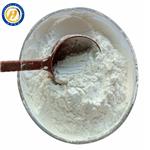
US $0.00-0.00/kg2024-04-30
- CAS:
- 57-83-0
- Min. Order:
- 1kg
- Purity:
- 99%
- Supply Ability:
- 500
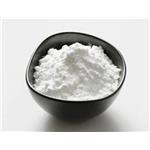
US $1.00/kg2024-04-30
- CAS:
- 57-83-0
- Min. Order:
- 1kg
- Purity:
- 99%
- Supply Ability:
- 100kg
